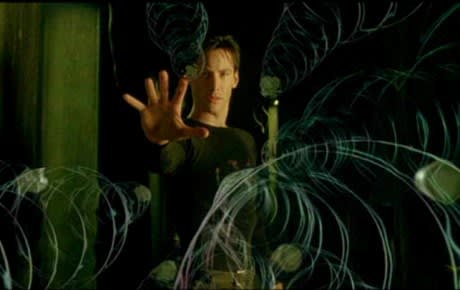Upon release, The Matrix was a bit of a shock to the populist system, featuring a cynical metaphysical narrative that flipped the bird to the status quo and a graphic novel aesthetic that had been attempted but never perfected with such glossy, hyper-kinetic consistency. The visual effects were groundbreaking, featuring still frame imagery taken from a series of digital cameras, as was the stunt work, which rapidly combined fighting styles from throughout Asia to create a palpable, invigorating action viewing experience.
But, much like American Beauty this explosive, revolutionary cinematic event suffered the wrath of an industry that encourages vultures to replicate success, taking away from the intensity and lasting power of the original film that inspired it all.
The digital technology trademarked by The Matrix started to pop up in every possible scenario, most embarrassingly in Charlie's Angels and Scary Movie. Similarly, the anti-capitalist, social anarchy template became the status quo for all things pertaining to action Sci-Fi, making even the prospect of trying to deconstruct identity through growth in perception a bit of a cliché and joke.
Because of this cultural ubiquity, the story of office drone and hacker, Neo (Keanu Reeves), and his voyage down the rabbit hole into a reality where human beings are little more than batteries exploited by artificial intelligence, doesn't pack quite the punch that it once did.
Chiefly, since the visual effects are no longer as impressive—looking past the eye of a film historian that can appreciate the evolution of cinema—the actual explanation of the Matrix and what it is comes across as rather lethargic and clumsily expository. They spend a good hour telling Neo who he is and what their world is like and how it might be easier for him to buy into the illusion.
The cinematography is still quite compelling, having a wandering comic book eye with multi-dimensional focus that gives a sense of stylized paranoia, but, again, since the comic book hero movie dominated the early part of the 21st Century, it's not quite as unique or surprising.
None of this is the fault of the Wachowski's. In fact, their eventual criticism for continuing to experiment with the medium, creating bubblegum saturated cartoon environments in Speed Racer and playing with tempo, soundtrack and pacing to construct an opera of sorts with Cloud Atlas, is far too harsh. They're a visionary duo more concerned with challenging the medium and exploring new territory than placating fans with a rehash of things they've championed in the past.
As such, this early work, while damaged by the works of countless dilettantes, holds a place in cinematic history, playing with storytelling, both visual and narrative, without insulting the intelligence of an occasionally capable audience.
The Matrix screens at the TIFF Bell Lightbox as part of the Whoa: The Films of Keanu Reeves retrospective at 9pm on March 22nd, 2013.
(Warner)But, much like American Beauty this explosive, revolutionary cinematic event suffered the wrath of an industry that encourages vultures to replicate success, taking away from the intensity and lasting power of the original film that inspired it all.
The digital technology trademarked by The Matrix started to pop up in every possible scenario, most embarrassingly in Charlie's Angels and Scary Movie. Similarly, the anti-capitalist, social anarchy template became the status quo for all things pertaining to action Sci-Fi, making even the prospect of trying to deconstruct identity through growth in perception a bit of a cliché and joke.
Because of this cultural ubiquity, the story of office drone and hacker, Neo (Keanu Reeves), and his voyage down the rabbit hole into a reality where human beings are little more than batteries exploited by artificial intelligence, doesn't pack quite the punch that it once did.
Chiefly, since the visual effects are no longer as impressive—looking past the eye of a film historian that can appreciate the evolution of cinema—the actual explanation of the Matrix and what it is comes across as rather lethargic and clumsily expository. They spend a good hour telling Neo who he is and what their world is like and how it might be easier for him to buy into the illusion.
The cinematography is still quite compelling, having a wandering comic book eye with multi-dimensional focus that gives a sense of stylized paranoia, but, again, since the comic book hero movie dominated the early part of the 21st Century, it's not quite as unique or surprising.
None of this is the fault of the Wachowski's. In fact, their eventual criticism for continuing to experiment with the medium, creating bubblegum saturated cartoon environments in Speed Racer and playing with tempo, soundtrack and pacing to construct an opera of sorts with Cloud Atlas, is far too harsh. They're a visionary duo more concerned with challenging the medium and exploring new territory than placating fans with a rehash of things they've championed in the past.
As such, this early work, while damaged by the works of countless dilettantes, holds a place in cinematic history, playing with storytelling, both visual and narrative, without insulting the intelligence of an occasionally capable audience.
The Matrix screens at the TIFF Bell Lightbox as part of the Whoa: The Films of Keanu Reeves retrospective at 9pm on March 22nd, 2013.
